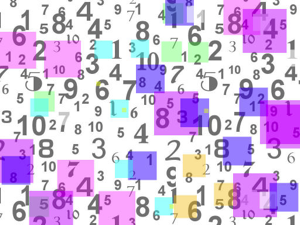 Today, we're going to have a little fun with math.
Today, we're going to have a little fun with math.
If you don't believe that math can be fun, then you haven't spent nearly enough time at this blog. To prove it, we'll need to add a little magic.
Don't worry, I'll start off slowly. Let's take a look at some mathematical magic tricks from Magic Roadshow Online Magazine #132 (June 2012 issue). The first one is called Calendar Cards:
With their card on top of the face-down deck, ask the spectator how many weeks are in a year? When they answer '52'... deal five cards face down on the table and then two cards face down on top of the five. Pick up all seven cards as one and drop them back on top of the deck.Why does this work? Start with the first step, in which 7 cards (5 + 2) are dealt. What happens to the cards? Card 1 becomes card 7, card 2 becomes card 6, and so on. In simpler terms, card x becomes card 8 - x. What does 8 have to do with anything? It's simply one more than the number of cards that were dealt (7, in this case).
Next, ask how many months are in a year? Most folks will reply '12', and you then deal twelve cards face down on the table. As before, pick up all twelve and put them back on top of the deck as one.
"How many days are in a week?" When they answer '7', repeat the process of dealing seven cards face down and then replacing them on top of the deck.
"And lastly, how many parts do we divide the day into..?" The answer is '2' - AM and PM. Deal two cards face down and replace them on the deck as before.
At this point, the spectators card is back on top of the deck. You can now reveal it any way you wish...
At this point, card 1 has become card 7. Next, 12 cards are dealt, so each card x moves to a position equal to 13 - x (Again, 13 being 1 more than the number of cards that were dealt). A quick look at this 13 - x chart reveals that card 7 is now card 6.
Next, 7 cards are dealt again, so we go back to the 8 - x table we used before, and see that the 6th card is now the 2nd card. Dealing 2 cards for AM & PM moves card x to 3 - x (do you see why?), which moves card 2 to being card 1.
This is a fun principle to play around with. For example, what happens to the cards when you spell your first name and then your last name? If they both have the same number of letters, this will just bring the cards back to their original order, but what happens if your first name is longer than your first? Or shorter? How can you get the original top card back to the top?
There are several other good mathematical magic routines on that same page. There's Double Reveal, which takes advantage of the formula ((2x + 5) * 5) + y. Comedy Reveal displays some surprising qualities of multiplying by 33, then multiplying by 3367.
The No Hands Trick: Calculated Digits is another good one with which to experiment. When you have the spectator perform what is effectively the formula ((2x + 2) * 5) - 7, you show what seems to be an amazing prediction. Looking at the table of possible answers, it's much simpler than it first appears. What would you do if you wanted your prediction to be a 4 instead of 3? How about a 7? Play with the formula and see if you can work it out.
One of the best things about the above tricks is that they're all a great way to get students involved in a deeper understanding of algebra. These tricks can help people understand that you can start from what seems to be complex, and find (and use!) the important underlying patterns.
Mathematical tricks don't only have to rely on algebra. For a wider variety of mathematical principles applied to magic tricks, check out Peter McOwan's and Matt Parker's new FREE ebook (PDF), The Manual of Mathematical Magic. There's no sign-ups or any other requirements, you simply go to their site, click the PDF link, and save it to your computer after it loads. The routines are divided by the type of math employed, so you can easily find an appropriate trick for any student.
If you have any favorite mathematical magic routines of your own, I'd love to hear about them in the comments!




No Response to "Free Mathematical Magic"
Post a Comment